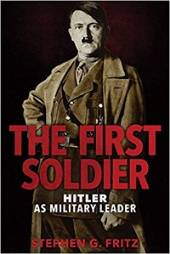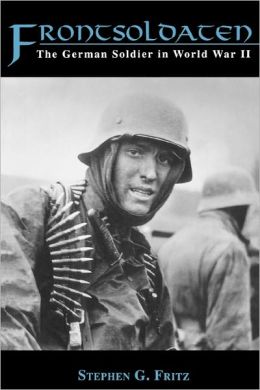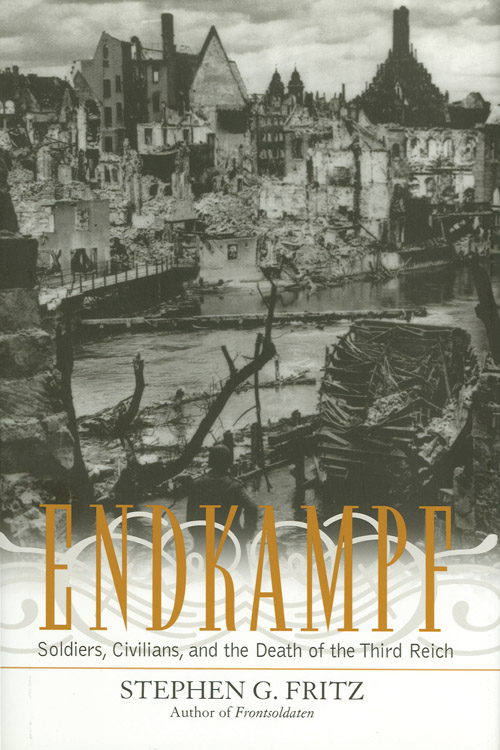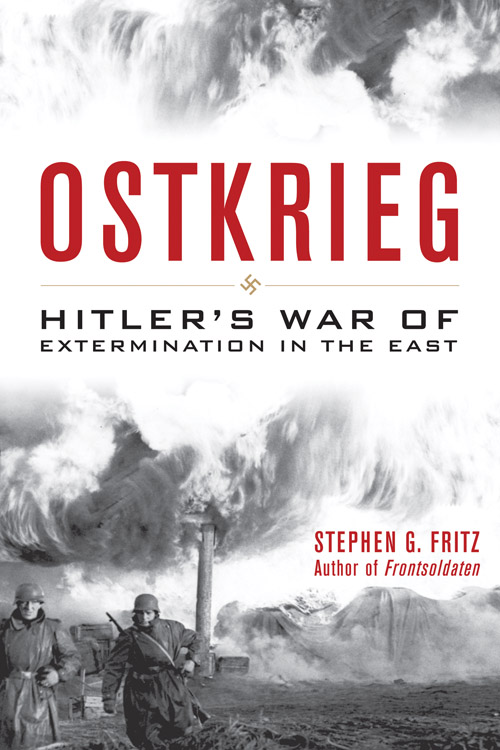Education:
B.A., 1971, University of Illinois
M.A., 1973, University of Illinois
Ph.D., 1980, University of Illinois
About Dr. Fritz:
Stephen G. Fritz joined the faculty of the Department of History at East Tennessee State University in the Fall of 1984. His specialty is nineteenth and twentieth century European History, with a focus on twentieth century Germany. His scholarship has ranged from liberal politics in the late 1920's Weimar Republic to the rise of Nazism, from the influenza epidemic of 1918-19 in Germany to the origins of the Holocaust. He is the author of a trilogy of well-received books, published by the University Press of Kentucky, on various aspects of World War II.
Areas of Academic Specialty
- 19th and 20th Century Europe
- Modern Germany
- World War I
- World War II
- The Holocaust
- The 'Coercive Utopias'
- The Cold War in Europe
Web Pages of Interest
Dr. Fritz's Personal Faculty Webpage
Selected Publications:
Books:

The First Soldier: Hitler as Military Leader
A leading expert offers a new assessment of Hitler as military commander and strategist.
It is often said that Hitler lost Germany the war. His uncompromisingly radical goals,
impulsiveness, tendency to pursue several objectives simultaneously and his inherent
mistrust of subordinates propelled the country towards humiliating defeat. Indeed Hitler’s
own generals published memoirs after the war claiming that their military leadership
had been catastrophically undermined by the Führer’s erratic decision making.
But how far is all this true?
In this eye-opening account, Stephen Fritz argues that the question of Hitler’s military leadership is complex and nuanced. Dispelling the notion that Hitler’s strategy was inadequate and ill-informed, Fritz shows how it could be considered rational, coherent and competent. While Hitler’s generals did sometimes object to their leader’s tactics and operational direction, Fritz shows that they were often in agreement regarding their leader's larger strategic and political goals.
Weaving together primary documents, records of military conferences, diaries, memoirs, and Hitler’s own words, Fritz provides a provocative reassessment of Hitler’s role as military commander.
“Perhaps the best account we have to date of Hitler’s military leadership. It shows a scrupulous and imaginative historian at work and will cement Fritz’s reputation as one of the leading historians of the military conflicts generated by Hitler’s Germany.”—Richard Overy, author of The Bombing War
“Magnificent. Hitler emerges as a complex and nuanced military leader who cannot simply be dismissed as the dogmatic ideologue or the corporal in command. Original, insightful and authoritative Fritz’s latest work is something I will return to again and again.”—David Stahel, author of The Battle for Moscow
“Cuts a swathe through the reconstituted arguments of countless other books about Hitler. Meticulously researched and adopting a thoroughly readable style, Fritz offers profound new insights about Hitler as commander. This is a volume which should serve as a warning to strategic leaders who become blinkered by ideology, self-absorbed and neglect the requirements of successful leadership.”—Lloyd Clark, Blitzkrieg
Frontsoldaten: The German Soldier in World War II (Lexington: The University Press of Kentucky, 1995).
Hitlers Frontsoldaten: Der erzählte Krieg, trans. Klaus Kochmann (Berlin: Henschel Verlag, 1998).
Frontsoldaten: den Tyske Soldaten under Andra Världskriget, trans. Inge R. L. Larsson & Kjell Waltman (Stockholm: Fischer & Co, 2011).
onierze Hitlera. Wehrmacht na frontach drugiej wojny wiatowej. (Warsaw: Wydawnictwo RM, 2013).
Alois Dwenger, writing from the front in May of 1942, complained that people forgot "the actions of simple soldiers....I believe that true heroism lies in bearing this dreadful everyday life." In exploring the reality of the Landser, the average German soldier in World War II, through letters, diaries, memoirs, and oral histories, Stephen G. Fritz provides the definitive account of the everyday war of the German front soldier.
The personal documents of these soldiers, most from the Russian front, where the majority of German infantrymen saw service, paint a richly textured portrait of the Landser that illustrates the complexity and paradox of his daily life. Although clinging to a self-image as a decent fellow, the German soldier nonetheless committed terrible crimes in the name of National Socialism. When the war was finally over, and his country lay in ruins, the Landser faced a bitter truth: all his exertions and sacrifices had been in the name of a deplorable regime that had committed unprecedented crimes.
With chapters on training, images of combat, living conditions, combat stress, the personal sensations of war, the bonds of comradeship, and ideology and motivation, Fritz offers a sense of immediacy and intimacy, revealing war through the eyes of these self-styled "little men." A fascinating look at the day-to-day life of German soldiers, this is a book not about war but about men. It will be vitally important for anyone interested in World War II, German history, or the experiences of common soldiers throughout the world.
Endkampf: Soldiers, Civilians, and the Death of the Third Reich (Lexington: The University Press of Kentucky, 2004)
At the end of World War II, Gen. Dwight D. Eisenhower, fearing that retreating Germans would consolidate large numbers of troops in an Alpine stronghold and from there conduct a protracted guerilla war, turned U.S. forces toward the heart of Franconia, ordering them to cut off and destroy German units before they could reach the Alps. Opposing this advance was a conglomeration of German forces headed by SS-Gruppenführer Max Simon, a committed National Socialist who advocated merciless resistance. Under the direction of officers schooled in harsh combat in Russia, the Germans succeeded in bringing the American advance to a grinding halt.
Caught in the middle were the people of Franconia. Historians have accorded little mention to this period of violence and terror, but it provides insight into the chaotic nature of life while the Nazi regime was crumbling. Neither German civilians nor foreign refugees acted simply as passive victims caught between two fronts. Throughout the region people pressured local authorities to end the senseless resistance and sought revenge for their tribulations in the "liberation" that followed.
Stephen G. Fritz examines the predicament and outlook of American GI's, German soldiers and officials, and the civilian population caught in the arduous fighting during the waning days of World War II. Endkampf is a gripping portrait of the collapse of a society and how it affected those involved, whether they were soldiers or civilians, victors or vanquished, perpetrators or victims.
Ostkrieg: Hitler's War of Extermination in the East (Lexington: The University Press of Kentucky, 2011).
On June 22, 1941, Germany launched the greatest land assault in history on the Soviet Union, an attack that Adolf Hitler deemed crucial to ensure German economic and political survival. As the key theater of the war for the Germans, the eastern front consumed enormous levels of resources and accounted for 75 percent of all German casualties. Despite the significance of this campaign to Germany and to the war as a whole, few English-language publications of the last thirty-five years have addressed these pivotal events.
In Ostkrieg: Hitler's War of Extermination in the East, Stephen G. Fritz bridges the gap in scholarship by incorporating historical research from the last several decades into an accessible, comprehensive, and coherent narrative. His analysis of the Russo-German War from a German perspective covers all aspects of the eastern front, demonstrating the interrelation of military events, economic policy, resource exploitation, and racial policy that first motivated the invasion. This in-depth account challenges accepted notions about World War II and promotes greater understanding of a topic that has been neglected by historians.
Articles:
"The Search for Volksgemeinschaft: Gustav Stresemann and the Baden DVP," German Studies Review, 7, #2 (May 1984), pp. 249-280.
"'The Center Cannot Hold.' Educational Politics and the Collapse of the Democratic Middle in Germany: The School Bill Crisis in Baden, 1927-1928," History of Education Quarterly, 25, #4 (Winter 1985), pp. 413-437.
"In the World of Auschwitz: Aspects of the Final Solution," Social Science Perspectives Journal, 1, #2 (1986), pp. 1-23.
"The NSDAP as Volkspartei: A Look at the Social Basis of the Nazi Voter," The History Teacher, 20, #3 (May 1987), pp. 379-399.
"When History Wasn't History: The 1918-1919 Influenza Epidemic in Germany," Social Science Perspectives Journal, 2, #2 (1987), pp. 93-104.
"Reflections on Antecedents of the Holocaust," The History Teacher, 23, #2 (February 1990), pp. 161-179.
"Frankfurt," in Fred R. van Hartesveldt, ed., The 1918-1919 Pandemic of Influenza. The Urban Impact in the Western World (Lewiston, NY: Edwin Mellen Press, 1992), pp. 13-32.
"'We are trying to change the face of the world.' Ideology and Motivation in the Wehrmacht on the Eastern Front: The View From Below," The Journal of Military History, 60, (October 1996), 683-710.
"'This is the Way Wars End, With a Bang not a Whimper:' Middle Franconia in April 1945," War and Society, 18, #2 (October 2000), 121-153.
 Sam Wilson West Parking Lot C...
Sam Wilson West Parking Lot C... 


